
Numerous dissolved minerals and salts can be found in urine. Stones can form when your urine contains excessive levels of certain minerals and salts. Some stone forming composites include Calcium, oxalate, urate, cystine, xanthine, and phosphate. Kidney stones can be smaller in size but they can grow larger as well.
Types of kidney stones
- Calcium oxalate: It is the most common type of kidney stone, it formed when calcium in the urine reacts with oxalate. Insufficient calcium and fluid intake, as well as other factors, may play a role in their development.
- Uric acid is another prevalent type of kidney stone. Purines are a natural chemical component found in foods like shellfish and organ meat. When you consume a lot of purines, your body produces more monosodium urate, which can cause kidney stones in the correct circumstances. This type of stones tend to run in families.
- Struvite: Infections in the upper urinary system create these stones, which are less prevalent.
- Cystine: These stones are very rare and usually tend to run in families.
Causes of kidney stones
- Not drinking enough water.
- Including the foods in the diet that cause the stones in one’s diet (phosphate, for example, is in meat, fish, beans and other protein-rich foods).
- Family history of kidney stones
- Having a urinary tract obstruction.
You may also be more likely to acquire stones if you have certain medical conditions. This is due to the fact that they have the potential to enhance or reduce the quantities of the components that make up a kidney stone. Some examples of these conditions are:
- Hypercalciuria is a condition in which the body produces too much calcium in your urine.
- High blood pressure.
- Diabetes
- Obesity
- Osteoporosis
- Cystic fibrosis and gout.
- Cysts in the kidneys.
- Parathyroid disease.
- Irritable bowel syndrome and persistent diarrhea.
- Weight loss surgery and other stomach or intestine surgeries are examples of surgical procedures.
Some drugs can make you more likely to acquire a stone. The following drugs are among them:
- Diuretics (water pills).
- Antacids with calcium as a main ingredient (used to treat osteoporosis).
- Crixivan (used in the treatment of HIV infections).
- Dilantin and Topamax (used to treat seizures).
- Cipro is a prescription antibiotic (ciprofloxacin, an antibiotic).
- Ceftriaxone is a kind of antibiotic (an antibiotic).
You can potentially get a kidney stone if you eat certain foods. Among these foods are:
- Meats and poultry (animal proteins).
- Diet rich in sodium
- Sugars (fructose, sucrose and corn syrup)
Symptoms
One or few of the following symptoms could be present:
- severe pain on either side of your lower back
- a more generalized pain or a stomach ache that won’t go away
- Urine with blood in it
- fever
- urine with a foul smell or a cloudy appearance
When a kidney stone causes irritation or blockage, it begins to hurt. This quickly escalates into excruciating pain. Kidney stones pass in the most cases without imposing damage, but not without causing a great deal of discomfort. For tiny stones, pain medications may be the only option. Other treatments may be required, mainly if the stones are causing long-term problems or other complications.
Treatment for kidney stones
Kidney stones are treated likewise in children and adults. You may be advised to drink a lot of water. Doctors try to pass the stone without needing surgery. You might also be prescribed medicine to make your pee less acidic. However, if it is too large, restricts the passage of urine, or shows signs of infection, it is surgically removed.
- Shock-wave lithotripsy is a painless process that uses high-energy sound waves to shatter stones into smaller fragments that can be carried out more easily in the urine.
- Ureteroscopy is another method in which an endoscope is introduced through the ureter to retrieve or destroy the stone during ureteroscopy. Doctors will only perform percutaneous surgery if the stone is particularly large or difficult.
- Percutaneous nephrolithotomy is used when other treatments fail to treat kidney stones, such as when there are too many stones, the stones are too large or heavy, or the stones are in an inconvenient place.
If you experience any of the above-mentioned symptoms of kidney stones it is highly important to visit the Urologist as soon as possible. The Best Urologist in Lahore are available for consultations through oladoc.




